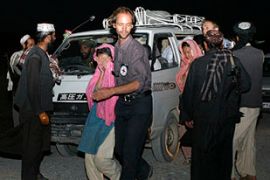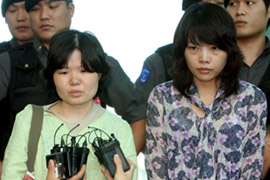Taliban free all Korean hostages
A man and two women handed over to ICRC officials, ending Afghan kidnap drama.

| In video |
|
|
The Taliban had freed 12 South Koreans on Wednesday, handing them over to the ICRC at three separate locations in central Afghanistan.
The group freed Wednesday were in a “safe place” on Thursday, an official in the South Korean embassy in Kabul said, refusing to divulge their whereabouts.
“They are taking a rest. They will be leaving Afghanistan soon,” he said on condition of anonymity.
|
|
The Taliban began freeing the remaining hostages after an agreement was reached during talks with a visiting delegation from South Korea.
Seoul’s small contingent of non-combat troops in the country will also be withdrawn within the year.
Alan Fisher, reporting for Al Jazeera’s from Kabul, said the Koreans released on Thursday would now be given brief medical checks and reunited with their colleagues in the Afghan capital.
Ransom rumours
“I spoke to one senior Afghan authority who, while not confirming the figure, did say that money was paid – that the South Koreans had paid cash to the Taliban.”
 |
| The Taliban had already released two Korean hostages as a “goodwill gesture” [EPA] |
But Qari Mohammad Bashir, a Taliban commander, denied that a ransom had been paid.
“I strongly deny this. It’s not true that money was involved,” he said.
Al Jazeera’s Tony Birtley, reporting from South Korea, said: “Most people here [in Seoul] think that South Korea has probably paid a ransom, but that will be debated later when the hostages have returned home safely.”
Meanwhile, the father of one of the men who was killed condemned the church that organised the trip.
“I wonder why the church was so reckless in taking them to the dangerous country,” Shim Chin-Pyo, whose 29-year-old son was killed, said.
“They were in the wrong place at the wrong time, moving in such a conspicuous manner.”
Prior to the kidnapping, South Korea warned its citizens not to travel to Afghanistan and blocked many of its growing legion of evangelical Christians from going there due to safety concerns.
